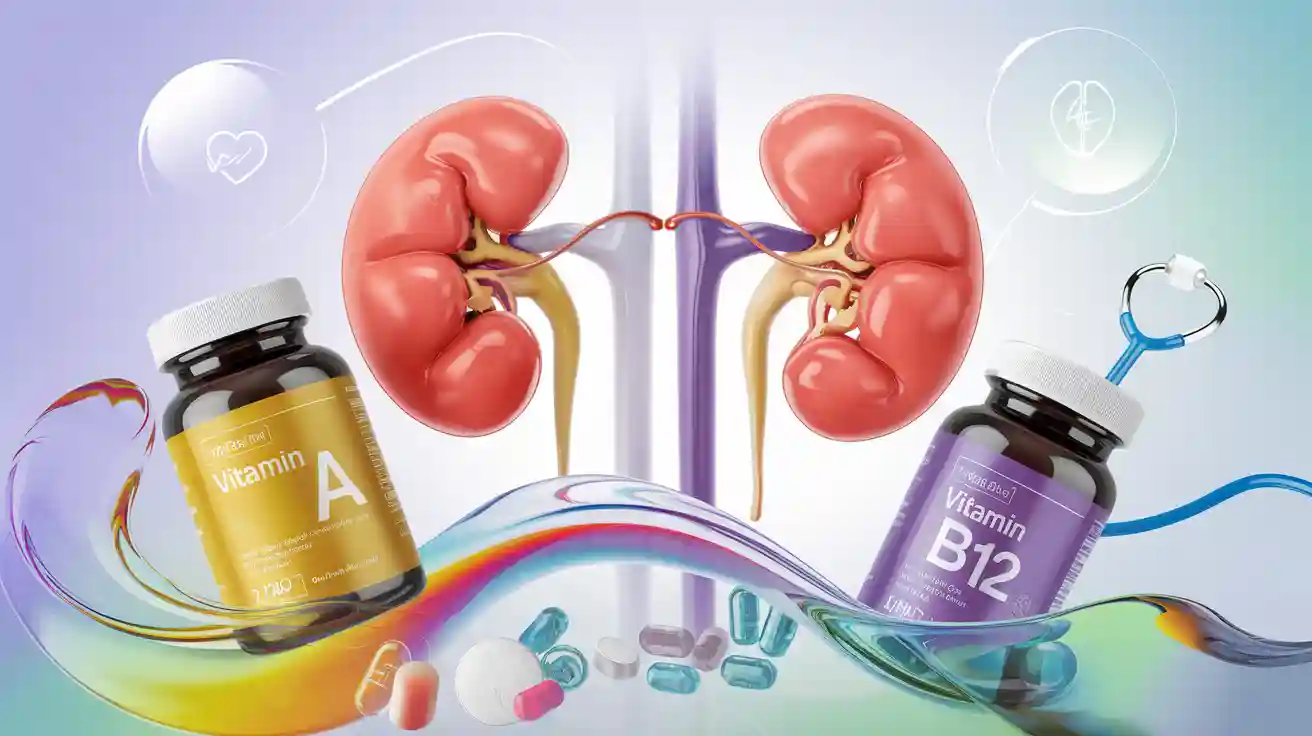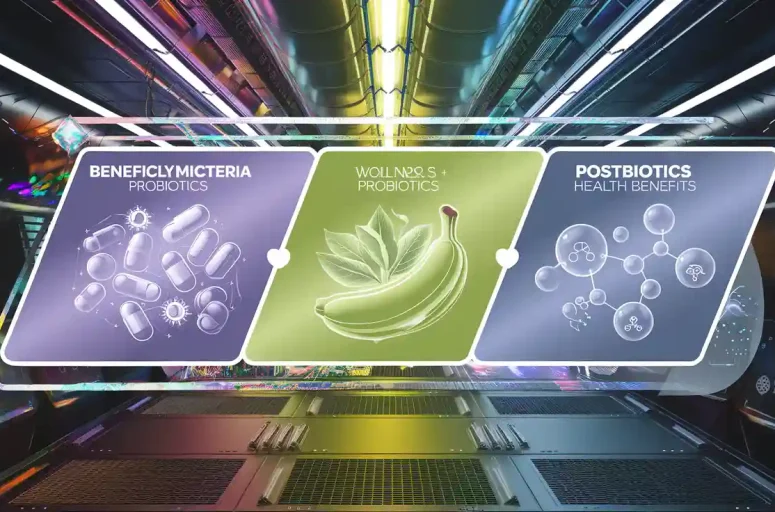
Many people with kidney disease consider kidney supplements to support their health. Clinical studies show that vitamin B12 supplements, especially injections after dialysis, safely lower homocysteine levels and may reduce heart risks for those with advanced kidney problems. Oral or low-dose B12 supplements seem less effective. No studies support vitamin A supplements for kidney health, and using them without guidance could cause harm. People should always talk to a doctor before starting any new kidney supplements. Understanding which vitamins matter most helps protect kidney health.
Medical Disclaimer: This information is for educational purposes only and does not replace professional medical advice. Always consult a healthcare provider before starting any supplements or making health-related decisions.
Key Takeaways
Vitamin B12 supplements help lower harmful homocysteine levels and support red blood cell production in kidney disease patients.
Vitamin A supplements are usually unsafe for kidney disease patients due to the risk of toxic buildup and should only be taken if prescribed by a doctor.
People with kidney disease should never self-prescribe supplements; always consult a healthcare provider before starting any new vitamins.
High doses of some vitamins, like vitamin C and vitamin D, can harm kidney health, so careful dosing and monitoring are essential.
Kidney disease often causes deficiencies in water-soluble vitamins like B12, folate, and vitamin C, which may require tailored supplementation.
Renal-specific vitamin formulas combine B12 with other B vitamins to better support kidney health and reduce anemia risks.
Testing vitamin levels through blood work helps doctors decide if supplements are needed and what doses are safe.
Avoid herbal supplements and multivitamins that contain vitamin A or potassium unless approved by a healthcare professional.
Kidney Supplements and Health
Supplement Safety
Kidney supplements can help manage nutrient levels, but safety remains a top concern. Not all supplements are safe for people with kidney disease. Some vitamins, like vitamin D, require careful monitoring by kidney specialists. Self-supplementation may lead to harmful effects. High doses of vitamin C can increase the risk of kidney stones, so experts recommend limiting intake to 60 mg daily. Biotin (vitamin B7) is usually safe in small amounts, but food sources are preferred. Herbal teas such as chamomile, ginger, and peppermint are generally safe, while licorice tea should be avoided due to its effect on blood pressure and potassium.
Vitamin B12 supplements, especially in the form of cyanocobalamin, may cause problems in chronic kidney disease. The kidneys normally help clear cyanide, a byproduct of cyanocobalamin metabolism. In kidney disease, this process slows down, which can lead to cyanide buildup and possible toxicity. Some studies link high doses of B12 to faster kidney function decline and increased cardiovascular events in people with diabetic nephropathy. Methylcobalamin may be a safer alternative, but more research is needed. No direct safety concerns have been found for vitamin A supplements, but experts do not recommend them unless prescribed.
Benefits for Kidneys
Supplements can support kidney health by addressing common deficiencies. People with kidney disease often need extra B vitamins, such as B6, B12, and folic acid, to help prevent anemia. Vitamin D and calcium are important for bone health, but both require medical supervision to avoid harm. Omega-3 fatty acids, dietary fiber, and coenzyme Q10 may help reduce proteinuria and inflammation. However, the overall effect on chronic kidney disease progression remains unclear.
A variety of kidney supplements are commonly recommended:
Omega-3 polyunsaturated fatty acids
Dietary fiber
Coenzyme Q10
Biotics
B vitamins (B6, B12, folic acid, biotin)
Vitamin C (with caution)
Calcium
Iron
Doctors emphasize the need for individualized dosing and regular monitoring.
Who Needs Supplements
Not everyone with kidney disease needs supplements. Those with chronic kidney disease who have low levels of folic acid or vitamin B12 may benefit from supplementation. Patients with advanced kidney disease or those on dialysis often require extra B vitamins to manage anemia and reduce risks related to disease progression. Kidney transplant recipients may also need high-dose B-vitamin therapy, though the benefits for heart health are not clear.
Routine supplementation for all kidney patients is not supported by current evidence. Doctors recommend testing vitamin levels before starting any supplement. People should always consult a healthcare provider to determine which kidney supplements are necessary and safe for their specific condition.
Vitamins and Kidney Health
Why Vitamins Matter
Vitamins play a vital role in keeping the body healthy, especially for people with kidney disease. The kidney helps regulate the balance of many vitamins, including water soluble vitamins like vitamin B12, vitamin C, and the B complex group. Healthy kidneys filter and reabsorb these nutrients, preventing them from being lost in urine. When kidney function declines, this process changes. The kidney may not reabsorb water soluble vitamins as well, leading to deficiencies. At the same time, the risk of vitamin buildup increases for some fat-soluble vitamins.
The following table shows how the kidney manages vitamin B12 and other water soluble vitamins:
Aspect | Summary |
|---|---|
Kidney Role in Vitamin B12 and Folate | The kidney filters and reabsorbs vitamin B12 and folate to prevent loss in urine. |
Receptors Involved | Special receptors in the kidney help take up vitamins and their carrier proteins. |
Vitamin B12 Transport | Vitamin B12 travels in the blood attached to proteins. The kidney reabsorbs these complexes. |
Storage and Metabolism | The kidney stores and helps process vitamin B12, supporting balance in the body. |
This careful management highlights why vitamins, especially water soluble vitamins, matter so much in kidney disease.
Deficiencies in Kidney Disease
People with chronic kidney disease often develop deficiencies in several vitamins. Water soluble vitamins, such as vitamin B12, folate, and vitamin C, are especially at risk. These deficiencies can lead to problems like anemia, bone disease, and higher risk of heart issues. Vitamin B12 deficiency is linked to high homocysteine levels and anemia in kidney disease. Folate deficiency often occurs alongside low B12, making the problem worse.
Common vitamin deficiencies in chronic kidney disease include:
Vitamin B12, which helps prevent anemia and high homocysteine
Folate, which works with B12 to support blood health
Doctors often recommend supplementing vitamin D and B complex vitamins to manage these risks. However, vitamins A, E, and K can build up and cause harm, so people with kidney disease should avoid them unless prescribed.
Over-Supplementation Risks
Taking too many supplements can be dangerous for people with kidney disease. The kidney cannot filter out excess vitamins as well, especially water soluble vitamins and minerals. Over-supplementation may cause toxicity, kidney injury, or worsen chronic kidney disease. Supplements with potassium or phosphorus can be especially harmful, since these minerals are often restricted in kidney disease.
Tip: Always tell your doctor about any supplement you take. Supplements are not regulated like medicines, so their strength and safety can vary.
Some people do not know they have kidney disease, which increases the risk of harm from unsupervised supplement use. High doses of vitamin D, for example, have caused kidney failure in some cases. Herbal supplements can also affect blood pressure or blood sugar, making kidney problems worse.
Vitamin B12 in Kidney Disease

Role of Vitamin B12
Vitamin B12 plays a central role in the management of kidney disease. This vitamin supports important metabolic processes, especially homocysteine metabolism. High levels of homocysteine often occur in chronic kidney disease and may increase the risk of heart problems. Vitamin B12 helps break down homocysteine, which can lower these risks. Clinical guidelines highlight that impairment in vitamin B12 metabolism is a nontraditional risk factor for poor outcomes in kidney disease. The kidney helps regulate vitamin B12 levels by filtering and reabsorbing it from the blood. When kidney function declines, vitamin B12 metabolism changes, which can affect overall health.
Vitamin B12 also works with other vitamins, such as folate, to support red blood cell production and maintain healthy nerve function. Renal vitamins often include vitamin B12 and other b vitamins to address common deficiencies in people with kidney disease. Although research shows some benefits from vitamin b supplements, experts agree that more studies are needed to set clear guidelines for vitamin B12 measurement and supplementation in chronic kidney disease.
Preventing Anemia
Anemia is a frequent complication in kidney disease. The kidney produces erythropoietin, a hormone that helps the body make red blood cells. When kidney function drops, erythropoietin levels fall, leading to anemia. Vitamin B12 is essential for producing healthy red blood cells. Many people with kidney disease develop vitamin b12 deficiency, which can make anemia worse.
Vitamin B12 deficiency is common in chronic kidney disease and contributes to anemia.
Vitamin B12 helps the body produce more red blood cells, improving anemia.
B12 works together with folate to break down homocysteine and support blood health.
Medical professionals recommend monitoring vitamin B12 levels and supplementing as needed to improve anemia outcomes.
Doctors often prescribe vitamin b12 supplements to treat or prevent anemia in kidney disease. These supplements help restore healthy red blood cell counts and may improve energy and quality of life. Vitamin b12, along with other b vitamins, forms the basis of many renal vitamins used in clinical practice.
Dosage and Safety
Vitamin B12 supplements come in several forms, including oral tablets and injections. The most common types are cyanocobalamin and methylcobalamin. People with kidney disease must use caution with high-dose cyanocobalamin. The kidney normally clears small amounts of cyanide produced from cyanocobalamin metabolism. In kidney disease, this process slows down, which can lead to cyanide buildup and possible toxicity. Clinical research shows that very high doses of b vitamins, including vitamin b12, might harm kidney function rather than help.
Although vitamin B12 does not have an upper intake limit for healthy people, those with kidney disease may experience negative effects from high-dose supplementation. Medical guidelines recommend consulting a healthcare professional before starting vitamin b12 supplements. Doctors can help determine the right dose and monitor for side effects. Methylcobalamin may be a safer option for people with kidney disease, but more research is needed.
Tip: Always talk to your doctor before starting vitamin b supplements or changing your dose. Supplements can interact with medicines and affect kidney health.
B12 with Other B Vitamins
Vitamin B12 rarely works alone in kidney health management. Doctors often recommend combining vitamin b12 with other B vitamins to address the unique needs of people with chronic kidney disease. These combinations help manage homocysteine levels, support red blood cell production, and improve overall metabolic balance.
Renal vitamins are special formulations designed for patients with kidney disease, especially those on dialysis. These products combine vitamin b12 with other b vitamins such as folic acid (B9), vitamin B6 (pyridoxine), thiamin (B1), riboflavin (B2), niacin (B3), and pantothenic acid. The doses in these formulas are higher than standard daily values to meet the increased needs of renal patients.
Note: General multivitamins may not suit people with kidney disease. They often contain inappropriate doses and can increase the risk of vitamin toxicity.
The main goals of combining vitamin b12 with other b vitamins in renal vitamins include:
Reducing elevated homocysteine levels, which are common in patients with low kidney function or on dialysis.
Supporting the production of healthy red blood cells and preventing anemia.
Regulating blood pressure and reducing oxidative stress in kidney cells.
Promoting overall kidney function and metabolic health.
Clinical trials show that oral vitamin b12 combined with folic acid and vitamin B6 can lower homocysteine levels by 30–50%. However, these combinations have not shown clear improvements in mortality or cardiovascular outcomes. Intravenous vitamin b12, such as hydroxycobalamin, can raise blood levels of vitamin b12 and reduce homocysteine, but the benefits for heart health remain uncertain.
A typical kidney formula may include:
Nutrient | Function in Kidney Health |
|---|---|
Vitamin B12 | Supports red blood cell production, lowers homocysteine |
Folic Acid (B9) | Works with B12 to manage homocysteine |
Vitamin B6 | Helps with protein metabolism and homocysteine control |
Thiamin (B1) | Supports energy production |
Riboflavin (B2) | Aids in cell growth and function |
Niacin (B3) | Supports metabolism |
Pantothenic Acid | Helps produce energy from food |
Vitamin C | Acts as an antioxidant |
Vitamin E | Protects kidney cells from damage |
Doctors recommend vitamin b supplements for patients on dialysis to replace losses during treatment and to support kidney health. These supplements are tailored to the needs of people with kidney disease, unlike general multivitamins. Patients should always consult a healthcare provider before starting vitamin b12 or other vitamin b supplements.
Vitamin A and Kidney Health

Vitamin A Functions
Vitamin A supports many biological processes in the body. In the kidney, retinol and its active form, all-trans retinoic acid, help regulate kidney development and nephron formation. The kidney uses special receptors, such as megalin, to reabsorb retinol and maintain vitamin A balance. Vitamin A metabolites protect kidney cells by controlling gene expression through nuclear retinoic acid receptors. These actions provide anti-inflammatory, antiapoptotic, and antioxidant effects, which help keep kidney cells healthy. During prenatal development, vitamin A status can influence the number of nephrons, affecting the risk of chronic kidney disease later in life. Changes in vitamin A and its transport protein, RBP4, often occur in kidney disease, linking vitamin A metabolism to kidney function and disease progression.
Note: Vitamin A plays a role in kidney health, but its importance is less emphasized compared to other vitamins like B12 or D.
Risks in Kidney Disease
People with chronic kidney disease face unique risks when it comes to vitamin A. As kidney function declines, vitamin A levels tend to rise because the kidney cannot clear retinol and retinol-binding protein efficiently. This accumulation can lead to toxicity, even at doses that are safe for healthy individuals. Chronic toxicity has been reported at doses as low as 4000 IU daily in people with renal failure.
Common risks of vitamin A toxicity in kidney disease include:
Increased bone resorption and bone weakness due to stimulation of osteoclasts
Higher risk of fractures and bone abnormalities
Hypercalcaemia, which can worsen vascular calcifications
Symptoms such as dry skin, nausea, headache, fatigue, irritability, anorexia, liver disease, hair loss, and increased cerebrospinal fluid pressure
Amplified toxicity risk when vitamin D levels are low, which is common in chronic kidney disease
Multivitamin preparations containing vitamin A may cause harm, especially in dialysis or advanced kidney failure
The kidney’s impaired ability to metabolize retinol and increased RBP concentrations contribute to vitamin A buildup. Toxicity can occur at much lower doses than in healthy people, so careful monitoring is essential.
Risk Factor | Impact on Kidney Disease Patients |
|---|---|
Impaired excretion | Elevated vitamin A levels |
Bone effects | Increased bone resorption, fracture risk |
Hypercalcaemia | Worsened vascular and bone health |
Multivitamin caution | Higher risk of toxicity |
⚠️ Tip: Patients with kidney disease should avoid routine vitamin A supplementation and use caution with multivitamins.
Dosage Guidance
Current guidelines do not recommend routine vitamin A supplementation for people with impaired kidney function. The Kidney Disease Outcomes Quality Initiative (KDOQI) advises limiting total dietary vitamin A intake to the Dietary Reference Intake (DRI) or Reference Nutrient Intake (RNI) values. Intake should not exceed standard recommended levels, and supplementation is generally discouraged. UK practice suggests avoiding vitamin A intake above twice the RNI. Even when intake is below the RNI, patients with chronic kidney disease and those on dialysis often show elevated serum vitamin A and RBP4 levels, indicating altered metabolism and increased risk of toxicity.
Dietary sources of vitamin A, such as liver, eggs, and dairy, often contain high potassium and phosphorus, which complicates intake for advanced kidney disease patients. Cooking methods that reduce potassium may also lower carotene content, making it harder to get enough vitamin A from food. Because of these challenges, guidelines emphasize limiting vitamin A intake to standard reference values, monitoring for toxicity, and individualizing care.
Medical Disclaimer: This content is for informational purposes only. Individuals should consult a healthcare professional before making health decisions or starting any supplements.
Key points for safe vitamin A intake in kidney disease:
Do not exceed the standard recommended daily intake.
Avoid vitamin A supplements unless prescribed by a doctor.
Monitor for signs of toxicity, especially in advanced kidney disease.
Choose dietary sources carefully, considering potassium and phosphorus restrictions.
Healthcare providers should assess vitamin A status and adjust recommendations based on individual needs.
Recommendation | Details |
|---|---|
Do not exceed standard reference values | |
Avoid supplementation | Unless prescribed by a healthcare provider |
Monitor serum retinol/RBP4 | Assess for toxicity |
Individualize care | Adjust based on kidney function and diet |
📝 Note: Vitamin A supplementation is rarely needed in kidney disease. Water-soluble vitamins may be safer for supplementation.
Choosing Kidney Supplements
Signs You Need Supplements
People with kidney disease may wonder when they need a supplement. Not everyone requires extra vitamins. Certain signs and lab results can help identify those who might benefit from vitamin b12 supplements. Doctors look for specific symptoms and test results before recommending any supplement.
Some key signs that may suggest a need for vitamin b12 supplementation include:
Macrocytic anemia, where the mean corpuscular volume (MCV) is greater than 100 fL
Elevated methylmalonic acid levels, which can point to a deficiency, especially in dialysis patients
Increased homocysteine levels, which often occur when b12 is low
Neutrophil hypersegmentation, seen when more than 5% of neutrophils have five or more lobes
Functional b12 deficiency, which can exist even if blood levels of vitamin b12 appear normal
Other causes, such as iron deficiency or low erythropoietin, can also affect anemia and MCV. Doctors consider these factors when deciding if a supplement is needed. There are no clear symptoms or lab findings that show a need for vitamin A supplementation in kidney disease.
Testing and Diagnosis
Doctors use several tests to check vitamin status in people with kidney problems. These tests help guide decisions about supplements. The following table shows common tests for vitamin b12 and their use in kidney disease:
Diagnostic Test | Use in Kidney Disease Patients | Cut-off Criteria / Notes |
|---|---|---|
Serum Vitamin B12 Level | First-line screening; may show false normal/high values in dialysis | < 200 pg/mL suggests deficiency; < 100 pg/mL is highly specific |
Methylmalonic Acid | Sensitive for functional deficiency; can be high in kidney dysfunction | > 0.4 μmol/L suggests deficiency but may reflect kidney impairment |
Homocysteine | Elevated in kidney disease; affected by b12 and folate status | > 15 μmol/L suggests deficiency but also rises with kidney issues |
Holotranscobalamin (active B12) | Shows active b12; lacks standard cut-offs in kidney disease | < 50 pmol/L considered low; needs more research |
Neutrophil Hypersegmentation | Rarely used; low sensitivity | > 5% neutrophils with ≥ 5 lobes |
Macrocytosis (MCV) | May be present but not specific | MCV > 100 fL suggests macrocytosis |
Doctors find it challenging to interpret these tests in kidney disease. Changes in metabolism and inactive b12 forms can affect results. Sometimes, a person may have a functional deficiency even if their vitamin b12 level looks normal. No standard tests exist for vitamin A status in kidney disease.
Consulting Your Doctor
Choosing the right supplement for kidney health requires professional advice. Doctors use symptoms, lab results, and medical history to decide if a person needs vitamin b12 or other supplements. They also consider possible interactions with medicines and the risk of toxicity. Self-supplementation can be risky, especially for people with kidney disease.
A healthcare provider can:
Review symptoms and test results
Recommend the right type and dose of supplement
Monitor for side effects or toxicity
Adjust treatment as kidney function changes
🩺 Medical Disclaimer: This content is for informational purposes only. Always consult a healthcare professional before starting any supplements or making health-related decisions.
Precautions and Vitamins to Avoid
Supplements to Use Carefully
People with kidney disease need to watch out for certain vitamins and supplements. Some can build up in the body and cause harm. Others may not help or could even make kidney problems worse. The following list shows vitamins and supplements that require extra caution:
Vitamin E: High doses can interfere with drug metabolism. The effects of vitamin E supplements in kidney disease remain unclear. Some studies show no benefit for heart or kidney health. Normal or low doses may be safe, but high doses need careful monitoring.
Vitamin A: The kidney cannot clear vitamin A well. This can lead to toxic levels, even with normal intake. Symptoms include bone pain, skin changes, and liver problems.
Calcium: Too much calcium can cause bone and blood vessel problems. People with kidney disease should not take more than 2,000 mg per day.
Potassium: Supplements should be avoided unless a doctor prescribes them. High potassium can cause dangerous heart rhythms.
Herbal supplements: Some herbs can harm the kidney or interact with medicines. Always check with a doctor before using them.
⚠️ Tip: Always tell your healthcare provider about any supplements you take. Some can cause problems, especially if you have kidney disease or recurrent urinary tract infections.
Drug Interactions
Supplements can interact with medicines and cause side effects. Vitamin B12 supplements may contain aluminum, which can build up in the body when the kidney does not work well. This can lead to nerve and bone problems. Doctors should monitor patients who receive vitamin B12 injections for a long time. Vitamin B12 therapy can also lower potassium levels, which may become dangerous. Potassium levels should be checked before and during treatment.
Nitrous oxide, used in surgery, can inactivate vitamin B12. This may cause anemia or nerve problems, especially in older adults. For vitamin A, retinoid drugs for acne or psoriasis can add to toxicity risk. Patients should avoid extra vitamin A if they use these medicines.
Supplement or Drug | Possible Interaction or Risk |
|---|---|
Vitamin B12 (injection) | |
Nitrous oxide | Inactivates vitamin B12 |
Increased risk of vitamin A toxicity | |
Orlistat | Lowers absorption of vitamin A |
When to Avoid Certain Vitamins
Doctors recommend avoiding or limiting vitamins when there is a risk of toxicity or when blood levels are already high. For example, vitamin D should only be taken if blood levels are below 30 ng/mL. Too much vitamin D can harm the kidney and heart. Calcium intake should stay below 2,000 mg per day in stages 3 and 4 of kidney disease. Potassium supplements are only for people with low potassium, not for everyone.
Vitamins should not be avoided without a reason. Doctors check blood tests to decide if a supplement is needed. People with kidney disease and those with recurrent urinary tract infections should not take extra vitamins unless a doctor recommends them. Over-supplementation can cause more harm than good.
🩺 Medical Disclaimer: This content is for informational purposes only. Always consult a healthcare professional before starting any supplements or making health-related decisions.
Recent research highlights several important points for people with kidney disease:
Vitamin A supplementation is usually not recommended because kidney problems can cause high vitamin A levels and increase the risk of toxicity, such as bone pain and liver damage.
Vitamin B12 deficiency often occurs in kidney disease, especially for those on dialysis. Supplementation helps prevent nerve damage, but the dose and form should match each person’s needs.
Vitamin | CKD Recommendation |
|---|---|
Vitamin A | Avoid supplementation; monitor for toxicity |
Vitamin B12 | Supplement if deficient; individualize dose and method |
Needs for vitamins vary based on kidney function, diet, and other health factors. Always consult a healthcare professional before starting supplements. This content is for informational purposes only.
FAQ
What vitamins are most important for kidney health?
Doctors often focus on B vitamins, especially B12, and vitamin D for kidney health. These vitamins help prevent anemia and support bone health. Vitamin A usually requires careful monitoring because it can build up in the body.
Can people with kidney disease take multivitamins?
Many multivitamins contain vitamins or minerals that may harm people with kidney disease. Doctors recommend renal-specific vitamins instead. Patients should always check with a healthcare provider before using any multivitamin.
Is vitamin B12 safe for people on dialysis?
Vitamin B12 is usually safe for people on dialysis when taken as prescribed. Doctors often recommend it to prevent anemia. High doses or certain forms, like cyanocobalamin, may require extra caution.
Should people with kidney disease avoid vitamin A supplements?
Yes. People with kidney disease should avoid vitamin A supplements unless a doctor prescribes them. The kidneys cannot clear vitamin A well, which increases the risk of toxicity.
How do doctors check for vitamin deficiencies in kidney disease?
Doctors use blood tests to check vitamin levels. They may measure vitamin B12, folate, and sometimes methylmalonic acid or homocysteine. These tests help guide supplement decisions.
Can supplements interact with kidney medications?
Yes. Some supplements can interact with medicines used for kidney disease. For example, vitamin B12 injections may affect potassium levels. Herbal supplements can also cause problems. Patients should always tell their doctor about all supplements.
What are signs of vitamin A toxicity?
Signs of vitamin A toxicity include dry skin, bone pain, headache, nausea, and liver problems. People with kidney disease may develop these symptoms even at lower doses.
Do all people with kidney disease need vitamin supplements?
Not everyone with kidney disease needs supplements. Doctors decide based on blood tests, symptoms, and diet. Some people may need extra B vitamins or vitamin D, but others do not.
Medical Disclaimer: This FAQ is for informational purposes only. Readers should consult a healthcare professional before making health decisions or starting supplements.


